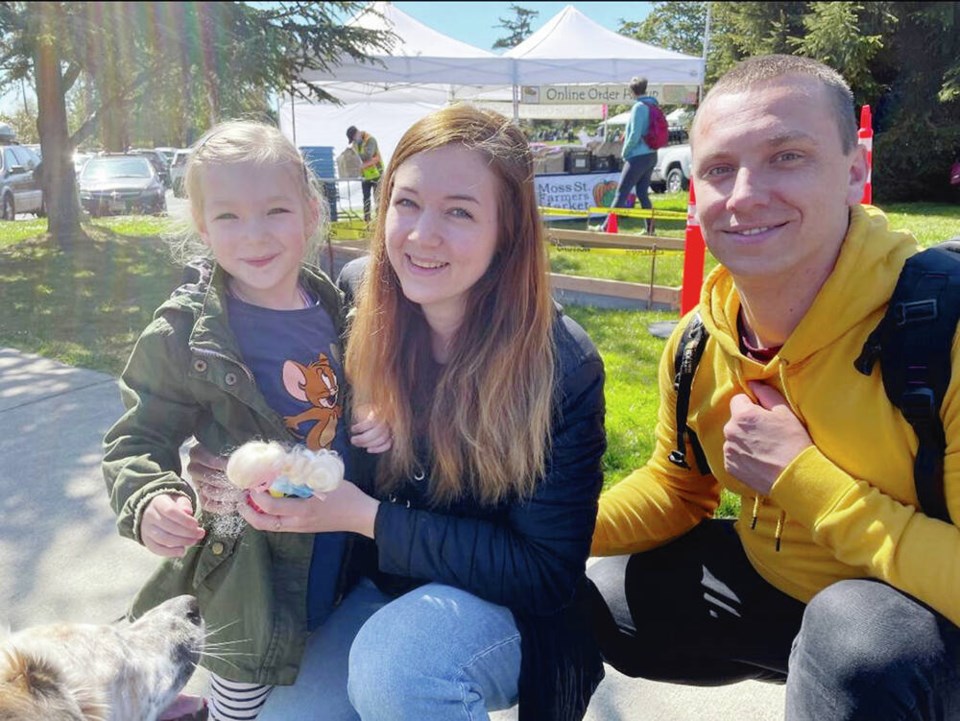Some residents of Kiwanis Village are learning how to speak Ukrainian, while others plan to bake cakes and other goodies as they prepare to welcome up to 40 Ukrainian refugees to their community, starting Aug. 6.
Kiwanis Village Society’s two-storey Heatherington House, on Cook Street in the Oaklands neighbourhood, has been leased to the Ukrainian Cultural Society of Vancouver Island — which operates the Ukrainian Cultural Centre — for one year.
The new Ukrainian village will be made up of 15 units, the majority bachelor suites with mini-kitchenettes and bathrooms. The building has a communal kitchen for the residents to prepare their own meals, a central meeting area with television and a sunroom.
The facility is across from Oswald Park, which has a community garden and a playground for the children.
“The residents are super excited to welcome their new neighbours,” said Meaghan Alford, administrator of Kiwanis Village, which typically houses 160 to 170 seniors living independently.
She said that many of the residents are looking forward to having children in the community.
The new home will primarily be for the elderly, single mothers with children, single women, LGBTQ+ people and those with disabilities.
Intended to be assistive living, it’s designed for people who are not ready to live independently, and the maximum stay is three months.
The announcement was welcome news for Devon Goldie, president of the Victoria branch of the Ukrainian-Canadian Congress, who has help settle 500 Ukrainians on Vancouver Island since the war began, from Port Hardy south — including 250 in Greater Victoria.
Ukrainians fleeing conflict in their homeland have been arriving in the region at a rate of between 15 and 20 individuals every week.
Goldie is part of Help Ukraine Vancouver Island, a collaborative project that has united Ukrainian organizations and supporters across Vancouver Island.
“The response has been really amazing and people are so generous,” she said. “We don’t expect hosts to take in families for more than three months, but we are always open for the host to help longer. We leave it up to the host and guest to work it out.”
She said the hope is that most refugees become self-sufficient and pay for their rental accommodation. “Most of them would be more than happy to pay rent,” said Goldie.
On Tuesday, the District of Oak Bay announced it has entered into negotiations with the Inter-Cultural Association of Greater Victoria to rent the group a property it owns on Hampshire Avenue.
The plan is to lease the two-bedroom house with an unfinished basement for a three-year term at $900 a month when maintenance is completed, expected to be September or October.
“We’re not in the housing business, so we are partnering with the Greater Victoria Housing Society to look after the property-management end,” said Jean McRae, CEO of the Inter-Cultural Association.
She said the demand for housing for refugees is constant, with her organization assisting with both government and private streams. This year has seen a 40 per cent jump in the number of individuals the group has resettled, although that’s in part because of backlogs resulting from COVID-19 restrictions. Clients range from individuals to families of up to nine.
While it’s difficult to find larger properties, singles sometimes have better luck — although McRae stressed it is still not easy. “Fortunately, everyone is trying to help the Ukrainians out,” said McRae.
She noted that for the first time, the federal government is offering regular settlement services to a group that are not technically refugees — Ukrainians have “temporary” residency status — which means they can get a social insurance number, language support and health services.
Some people are put up by distant relatives — or even friends of the distant relatives — and others have just been lucky.
Ukrainian newcomer Anastasiia Konstantynova met a family from Ukraine who had been living in Canada for 10 years and had a small apartment that they had been reserving for their relatives.
They talked, exchanged contacts, and parted ways.
“And then we heard the news that plans had changed. The relatives of our new Ukrainian acquaintances are not coming after all, and we can rent the apartment,” said Konstantynova, who lives with her partner. “As a sign of support, we received a good price for rent and a nice bonus in the form of Ukrainian neighbours.”
The United Way British Columbia says it sees 20 to 30 displaced Ukrainians arriving in B.C. every day. The service organization has matched 233 individuals so far, but many are still in hotels awaiting long-term accommodation.
“The number of hosts is not adequate,” said Pinder Rehal, senior communications specialist at United Way B.C. in Vancouver. “Most of the Ukrainians we see are from around Kyiv, so they are used to a metropolitan environment. With 90 per cent of the refugees coming to Vancouver, we are stretched. We are now telling them that there are metro areas outside of the Lower Mainland, such as Victoria and the Okanagan.”
The agency held a Zoom information meeting this week to encourage British Columbians to pitch in.
Back at the Kiwanis Village, Alford has a message for her new neighbours: “Let me know if you find any of the residents over-exuberant.”



